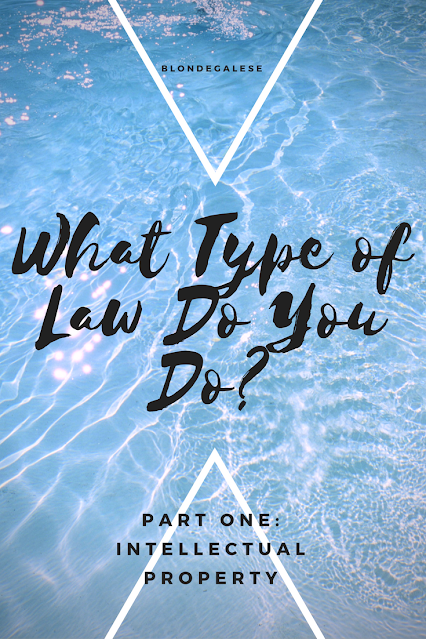Intellectual Property--"A category of intangible rights
protecting commercially valuable products of the human intellect. This category comprises primarily trademark,
copyright, and patent rights, but also includes trade-secret rights, publicity
rights, moral rights, and rights against unfair competition.”
-Black’s
Law Dictionary
Today was a very eventful day. I got cold-called on in my Civ Pro class for
the first time, tabled for Barbri, and attended a practice area roundtable. At my school, all 1Ls are required to attend
three of these round tables to see what practitioners in that particular field
do for their jobs. For these sessions, I’ll talk a little bit about what the
attorneys discussed when it came to their jobs and give you some insight into
what a career in that field is like! Today
was the first of the ones I’m attending and focused on Intellectual Property.
In intellectual property practice,
there are four different areas: patents,
trademarks, copyrights, and trade secrets.
Patent prosecution requires the passage of another bar, the patent bar,
and those with a specific number of science and engineering credits can
take. If you have a science related
background and even have any interest in doing patent work, multiple people have
indicated that this is a great addition to your resume. The patent bar is a one-time event, which
doesn’t require any additional learning credits like the traditional bar
does. Another nice thing about the
patent bar is you don’t have to have completed your JD to take it. A student from one of the schools I visited
told me he took the patent bar prior to entering law school and practiced
patent prosecution on the side during school.
For the other types of IP work,
there’s no required background other than the JD you receive at the end of your
three years in law school. For all of
these areas, there are two main avenues of practice: litigation and prosecution. The litigation work is mostly like other
areas of litigation but companies are typically suing other companies or
individuals in order to get them to stop using something similar to their
intellectual property. Prosecution work
typically focuses on filing the paperwork required to grant the issuance of a
trademark, patent, or copyright.
IP attorneys work in a variety of
different settings. Some work in
boutique IP firms, general practice firms, in-house counsel, or even the Patent
and Trademark Office. All vary with the
type of work an attorney performs. In
boutique IP firms, attorneys typically work in specialized areas while IP
attorneys in general firms work on a variety of projects in different
areas. The attorneys who spoke with us
indicated that after three years in a law firm doing IP work, you can then
typically get into any other job you want.
This is reliant on the fact not many people go into this area.
So that’s my discussion of IP work
and hopefully it was helpful for you to decide if that’s of any interest to
you. Also, if you ever go to these type of events, try to get business cards from the speakers that way you can start to build your professional network! I’ll hopefully have another post up
about more of the roundtables before the end of the week.




No comments:
Post a Comment